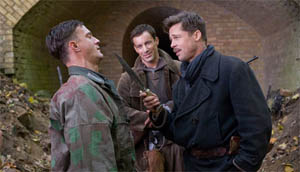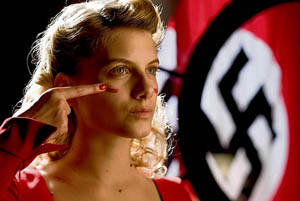|
Way back in the forties, World War II happened. Nazis kiled Jews, and occupied France. Apart from these broad strokes, don't expect to see much else here actually correspond to anything approaching real events. Rebounding after the disappointing Death Proof, Basterds is Tarantino's idea of a war movie. "War movie," is, however, a bit of a misnomer; there's really not much war in it. When one hears "war movie," they tend to think of Full Metal Jacket or Apocalypse Now. This is more in the vein of Casablanca, except for being nothing at all like Casablanca. Don't know what I'm talking about? Neither do I. I just watched the film and I have almost no clue as to what I saw. 
Into Nazi-occupied France head the titular Basterds (misspelled for reasons clear only to Tarantino), a squad composed mostly of Jewish-American soldiers whose mission is to breed fear amongst those in the occupation force, which they do with unbridled brutality. Elsewhere in France, a young woman named Shosanna finds herself being borderline courted by a German soldier named Zoller who turns out to be war hero, having shot an ungodly amount (or so he claims) of Allied troops from atop a bell tower. Anxious to use the event as propaganda, Joseph Goebbels has crafted a cinematic telling of the events entitled "Nation's Pride," which stars none other than Zoller, playing himself. The notion is floated to premiere the film, for Germans only, at the theater Shosanna owns. Being the sole survivor of a murdered Jewish family, she can see wonderful possibilities where a theater full of high-ranking Nazis is concerned. That is what happens in the movie, which is perfectly easy to follow. What it is about is entirely another matter. Is it about the dispassionate monstrosity of the Nazis, as so ably illustrated by the nail-biting first scene? Or is it about Nazis as comic-book villains, made to be derided and laughed at? Is it, for that matter, about laughing at nearly everyone involved? Brad Pitt's turn as a thickly-accented Tennessee native trying to go undercover as an Italian lends credence to that theory. Or is it, as so many have tried to argue, an assertion that war requires the removal of kid gloves in order to win, that uncompromising viciousness, performed with joyous abandon, would've ended the war sooner and spared more lives? I have never before been struck by the notion that a Tarantino film was in any way attempting to argue for a certain perspective, political or otherwise, and I get no such sense here, either. His films are about his characters, and about himself. One has only to wait for the requisite barefoot woman to show up to be reassured of that. 
What, then, does it mean to say that his films are about himself? Simply, that Quentin Tarantino films are about what he loves, and what he loves most of all, obviously, is film itself. Rather than expansive set pieces revolving around gritty battles, much of the film is intimately connected with the German film industry of the day in one way or another. The scenes we see of Goebbles' "Nation's Pride" propaganda flick are endless instances of Zoller shooting soldier after soldier, never missing or reloading his rifle, to unintentionally hilarious effect-unintentional for Goebbles, that is; completely intentional to Tarantino. The final set piece occurs within a movie theater, and Shosanna uses a movie camera as her own personal weapon in the fight against Hitler and his fascists. The final confrontation, with its ghostlike, laughing visage of a revenge achieved from beyond the grave, may be the most visually artistic thing the man has ever filmed, a catharsis the real World War II never gave the world. So what is it about? In the end, I can only conclude that it's about entertainment, pure and simple, if less simple than that produced by many practitioners of the art. Many audience members will be likely put off by the extremely large amount of subtitled dialogue, as vast stretches of the script are in French and German. Despite this filter, the talk is still quintessential Tarantino, with skilled verbal fencing replacing, or often building to, the more literal variety. One is most likely to come away remembering the character of Colonel Landa, an SS officer too cunning by half, calculating but never cold, taking a disturbing and amusing amount of glee in his work. He's almost a metaphor for the entire film: he's frightening, he's funny, and you're never really sure what he's going to do next. The final scene features a character staring straight into the lens proclaiming "This just might be my masterpiece." The insinuation couldn't have been more obvious if Quentin had appeared onscreen to deliver the line himself. Is it true? I can hardly say; I'm still working through what this film even is. It might take a few more viewings to sort that out. But I'm up for them, which tells me the important part. -review by Matt Murray
|
|
||||||||